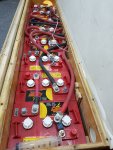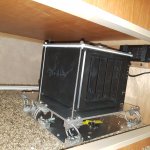Started a new thread so as not to derail the one this quote came from
my victron dealer also a blue sea dealer set me up with post style fuse holder which is great. However he said it should have a 100A fuse in it for my battery which is rated for 100A continuous and much higher in a short time.
actually I have two batteries and one fuse on each.
max load I could reasonably pull would be under 200. And I’ve taken great care to ensure cables to and from batteries are same length.
Others however have said the fuse should be 20% higher than battery rating. Cable is short and rated to 300A. And there are fuses downstream close to the loads so they should pop way before the battery ones do. But In an event like a wreck or something having 100a on each May make sense. I just wonder per your post above what the odds are that a quick draw of some sort would cause that fuse to blow occasionally instead of never.
in a pinch the terminal block can be removed entirely whereas an ANL block spliced in not so much unless you are wise enough leave your self enough slack to bridge the gap, presuming you cant get any fuses and have rectified the situation.. but really your master battery fuse should never really pop, the fuse box downstream should start blowing easy to obtain blade fuses long before this one pops.. the main battery fuse is more to prevent the rubble of your vehicle from catching on fire after an accident..
however having said that, I do carry a spare master fuse in my trailer even though I never expect to use it.. but I do that for lots of things thanks to my time in the BoyScouts.
my victron dealer also a blue sea dealer set me up with post style fuse holder which is great. However he said it should have a 100A fuse in it for my battery which is rated for 100A continuous and much higher in a short time.
actually I have two batteries and one fuse on each.
max load I could reasonably pull would be under 200. And I’ve taken great care to ensure cables to and from batteries are same length.
Others however have said the fuse should be 20% higher than battery rating. Cable is short and rated to 300A. And there are fuses downstream close to the loads so they should pop way before the battery ones do. But In an event like a wreck or something having 100a on each May make sense. I just wonder per your post above what the odds are that a quick draw of some sort would cause that fuse to blow occasionally instead of never.





 .
.




